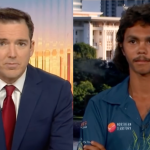
More that 290,000 people in Australia between the ages of 15 and 24 are unemployed. The rate of unemployment for teenagers alone has hit 20 percent – a level not seen since the 1990s. In fact now, in 2015, one in five unemployed Australians is a teenager. These stats prove just how difficult it is for Australia’s youth to find gainful employment. The process of job hunting and accessing unemployment benefits from Centrelink is universally agreed to be the pits by those who have experienced it. But the dominating dialogue from those higher up the chain – usually baby boomers and conservative press – paints a picture of a lazy generation, unwilling to “do the hard yards” to find work.
“My resume does not read like most politicians. I left school at 15
and moved out of home soon after. It’s the first time I’ve revealed
these details in public, and my hope is that my story will highlight
how crushing it is to be young and unemployed in Australia.
When I left school in 1996, I was really desperate to find a job.
I needed money to put food on the table and pay the rent, or
I would have been out on the streets. I applied for many, many
entry-level jobs – including abattoir work – near where I lived in Gippsland in country Victoria but
I couldn’t catch a break for a long time. It was soul-destroying. At times, tears were shed. I did not
have the financial support of my parents who were facing their own challenges, so I had to rely on
Centrelink payments for more than a year.
Although I did land my first job – working in manufacturing in Melbourne – when I was 17, the
experience of being a teenager and jobless was a very challenging time in my life. It only takes a
couple of knock-backs from jobs to bring your morale down. I definitely know what it’s like to build
your way from nothing. I know the challenges that young people in similar situations today face.
In country towns around Australia, it’s especially hard for young people as there isn’t the public
transport to even get you to a job interview if you don’t have access to a car – or parents who will
drive you.
I want to put it on the record that I completely object to the idea that “young people are lazy”. That’s a
lazy stereotype and does not fit the young unemployed people I talk to. Of course, it’s really important
to focus on trying hard to find a job but much more than a “good attitude” is needed these days to
land even an entry-level job. I tried hard, but I still found it tough to get work as an early school leaver
without work experience, qualifications or personal contacts.
With youth unemployment soaring – more than a quarter of a million aged 15 to 24 remain
unemployed – the big push seems to be for people to go to university. But one size does not fit all.
I think that well-structured programs in the community that help jobless youth build transitional
skills to get into the workforce are very important for those not suited to higher study. I am not a
fan of all work-for-the-dole schemes, either, but I did benefit from one well-run, community-based
program that was established when John Howard was Prime Minister.
I am now 34 years old, and I did not go to university like most people my age who enter politics.
I have worked my way through a series of manual occupations. The main part of my working life
has been in the tannery and timber industries where I worked hard to achieve leading hand, shop
steward and supervisory roles. But the businesses where I worked in both industries suffered
downturns. So there have been other, shorter periods in my life when I’ve been working as a casual
and had my hours cut or I’ve been out of work entirely, which put great strain on my wife and five
children. I remember one time, in my 20s, applying for a job in a florist’s shop to boost our income –
I didn’t even score an interview.
The growing unemployment problem in Australia was further amplified for me when I was confirmed
as a Senator for Victoria but had to wait about nine months to take up the role officially. I ended up
not having an ongoing job to fill that gap. I found myself unemployed again, this time in my 30s. The
bills didn’t pay themselves and I applied for anything and everything before I got work through a
contact at a small timber mill near home.
We can’t afford as an economy, let alone a society, to crush the hopes of the next generation.”
When confronted by media questioning about Senator Muir’s statement, current Social Services minister Scott Morrison stated he was open to considering dumping the Government’s planned six month Dole waiting period, stating, “If someone wants to put something on the table which is a good idea, well we can look at what’s on the table and take it off.“



